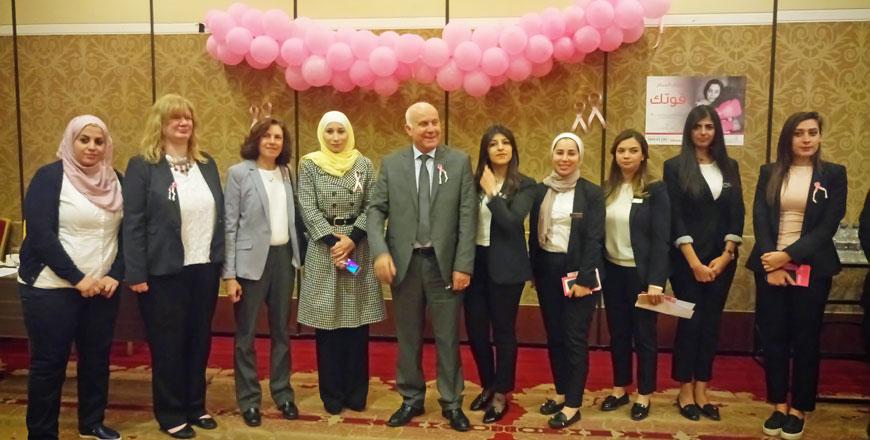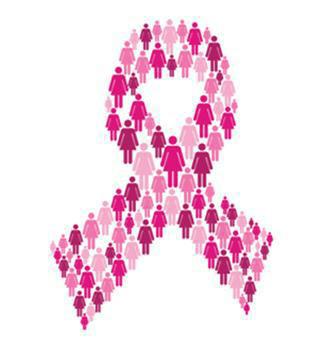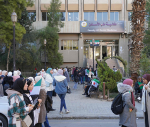You are here
Cancer survivor champions importance of early detection
By Ana V. Ibáñez Prieto - Oct 31,2018 - Last updated at Oct 31,2018

Breast cancer survivor Diana Nassar, Dr Alia Khair, Dr Adel Bilbaisi pose for a group photo in Amman on Wednesday (Photo by Ana V. Ibáñez Prieto)
AMMAN — “Had I not undergone early breast cancer detection 18 years ago, I would not have been able to stand here before you and share my survival story with my fellow women,” breast cancer survivor Diana Nassar said during an awareness lecture on breast cancer held by the Eastern Mediterranean Public Health Network (EMPHNET) on Tuesday.
“I was a busy mom and a working woman, and the possibility of having cancer had never crossed my mind. But, one sudden day, I felt a small lump on my left breast,” Nassar recalled, elaborating on how she underwent the tests that showed the presence of a calcification in her breast.
“The diagnosis came out positive and that was one of the most difficult times of my life, but I told myself that I was stronger than cancer, and that I was ready to overcome it,” Nassar told the attendees, noting how she continued to work throughout her treatment, despite the severe effects of the chemotherapy.
“But the symptoms of chemotherapy in my health disappeared completely when I finished my treatment,” the survivor stressed, urging cancer patients not to hesitate to undergo chemotherapy “before it’s too late”.
According to the Ministry of Health’s latest statistics issued in 2014, breast cancer accounts for 39.4 per cent of the total amount of cancer cases among women in the Kingdom, and 20.8 per cent of the cases among both genders.
Women between 40 and 59 years old are more likely to suffer from the disease, with the rate rising 55 per cent in this age group.
Targeting 35 hotel housekeeping staff members, the awareness lecture was held in the framework of the October nationwide breast cancer awareness campaign held by the King Hussein Cancer Foundation (KHCF) and the Jordan Breast Cancer Programme.
During the session, Dr Alia Khair of the Jordan Breast Cancer Programme briefed attendees on the different stages of breast cancer and its treatment, in addition to preventive measures such as the practice of periodic self examinations and mammograms.
Encouraging attendees to undergo periodic screenings starting from the age of 20, the doctor stressed that the rate of recovery for the disease stands at 98 per cent when detected at its first stage, while delayed detection can decrease the chances of recovery to zero per cent when caught at its last stage.
The doctor also addressed misconceptions and myths surrounding mammogram procedures, clarifying that the amount of radiation received by the patient during the screening is not harmful, while the benefits of early detection outweigh any risks associated with the process.
Commenting on the organisation’s drive to raise awareness on breast cancer, EMPHNET Executive Director Mohannad Al Nsour said “observing health awareness days is central to our scope of work, as we see ourselves as promoters of healthy lifestyles”.
“Early detection of breast cancer falls within this aim and it is with this outlook that we are proud to cement our collaboration with KHCF for years to come,” the doctor added.
In addition to the lectures, EMPHNET has also launched an initiative encouraging its employees to research the topic and create their own informative posters, in addition to organising their own fundraising sale in the benefit of breast cancer patients with limited means to afford their treatment.
Related Articles
AMMAN — Supporting Breast Cancer Awareness Month, an annual international campaign to increase attention and awareness about early detection
AMMAN — Children of breast cancer survivors on Sunday expressed their joy and gratitude for celebrating Mother’s Day with their mothers duri
AMMAN — HRH Princess Ghida Talal, chairperson of the King Hussein Cancer Foundation (KHCF) and Centre (KHCC), on Sunday launched the 8th Ara
















